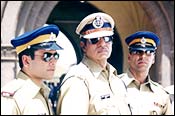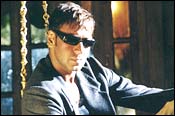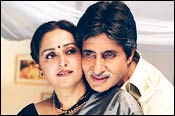 | « Back to article | Print this article |
Shridhar Raghavan is full of ideas. What he likes to call original ones.
 Like elder brother Sriram, who made his directorial debut last week with Ek Hasina Thi, Shridhar too has had a stint in journalism and television scriptwriting.
Like elder brother Sriram, who made his directorial debut last week with Ek Hasina Thi, Shridhar too has had a stint in journalism and television scriptwriting.
Rajkumar Santoshi's Khakee marks his debut as big screen scriptwriter. For someone who claims to have been fascinated by cops and their lives, Khakee offered ample scope for Shridhar to let loose with his pen.
His ultimate goal is to write, "The kind of films that I, as a ticket buying audience member, would love to watch."
In an interview with Sukanya Verma, he discusses the Khakee experience.
Did you always want to write movies? How did journalism and television happen?
I have written fiction from my college days. They were published in Science Today, Mirror, [publications] which are long dead now.
Back in the late 1980s and early 1990s, the only way to make money with a typewriter was to become a typist! So I drifted into advertising and journalism.
I met [director] Kundan Shah and did some writing for him. I learnt a lot in the process. In the mid 1990s, the whole television boom happened. Anjum Rajabali, who was with BITV, saw a pilot I had written and set the ball rolling for my scriptwriting career. I am hugely indebted to him. I did two shows, Aahat and CID, on Sony, spanned some 640 episodes and over 300 stories.
How did the script of Khakee come about? Were you specifically asked to write a film about cops?
I know [director Rajkumar] Santoshi through my friend Anjum. He was already keen to make a cop film with Amitabh Bachchan. I am like a huge fan of Mr Bachchan. I would have given my left arm to do a film at some point in my career with him, and here I was getting the chance to do one at the start of it! Also, I have always been obsessed with cops and police procedure.
Mr Santoshi and I got talking. I narrated a script I was working on about cops, dealing with a situation in society today, and he liked it. We kept that as a base and started working afresh, collaborating, writing, rewriting.
Then there was the question of how to present Mr Bachchan as a cop. After all, he is Mr Cop as far as Indian films are concerned, especially because of Zanjeer. It was a great recruitment ad for the force! How would that young, aggressive honest cop of Zanjeer age? How would life and the police force have treated him if he were a flesh and blood character? How would his colleagues see him? Would he have had a great career, a happily ever after situation? Would he have survived, fitted in or would his beliefs and moral stand make him asynchronous in a terrifyingly corrupt 21st century situation?
 The villain then was Ajit. Who or what was the villain now? These kind of questions and debates led to us coming to grips with the character of Anant Shrivastav in the film. Mr Bachchan added loads of layers himself which made Anant a very real, complex and troubled character. We put that character into the dramatic situation that was the premise of our film, and we got the spine of our script.
The villain then was Ajit. Who or what was the villain now? These kind of questions and debates led to us coming to grips with the character of Anant Shrivastav in the film. Mr Bachchan added loads of layers himself which made Anant a very real, complex and troubled character. We put that character into the dramatic situation that was the premise of our film, and we got the spine of our script.
Tell us about Khakee. What is the film trying to say?
On one level, Khakee is about the cops. It is a tough life, stress of the worst sort. You get paid s*&^ to deal with the worst sort of s&^% in society. No respect, just fear, long hours, interference, desensitisation! Family life. Well, what family life? And there is the temptation of corruption at every point of your career.
Different individuals react differently to the above problems. We took such a disparate bunch of characters, of different ages and outlooks and at different career stages -- from the naïve rookie to the honest but failed veteran, from the mildly corrupt cop who has reconciled himself quite happily to the situation to the totally desensitised cop who has crossed the line -- as our protagonists. How they would react to the same 'extraordinary' situation was our story.
At another level, Khakee is also about certain issues in society now. I would rather you see the film to get what I mean. Suffice to say that we took a disturbing situation in society and saw it through the eyes of a much maligned group, the police. We took our characters and, like in a lab experiment, put them into a round bottom flask, chucked in our dramatic situation, our premise, and lit the burner to see what happens!
You have co-written the film with director Rajkumar Santoshi. Was there any conflict of ideas? If yes, how would you two sort them out?
We agreed on characters, on story, on theme. So that was 90 per cent of any battle won. He is a fabulous writer in his own regard. Ghayal and Damini attest superbly to that. So I have massive respect for him as a writer.
It was a collaboration not just between director-writer but writer-writer. He never used his director's veto power to override anything, or made me feel I was a much junior writer working on my first film. We followed a simple policy in case of difference of opinion -- discuss, debate and convince.
His thinking was: if you can convince me, I am with you. He is superb at drama and dialogue. What my television director BP Singh used to call, 'boiling the scene'! He never lets any scene go without extracting its full dramatic potential, boiling it to the point where it threatens to spill (but it doesn't).
 Plus, he doesn't try to push you. And there is no pressure to see this DVD and whack this scene or copy that or whatever. He quite abhors that. I had a ball writing this film.
Plus, he doesn't try to push you. And there is no pressure to see this DVD and whack this scene or copy that or whatever. He quite abhors that. I had a ball writing this film.
What kind of research did you do to convey a realistic portrayal of policemen?
Cops and police procedure have been a fascination so characterisation was easier. As for research, we were surrounded by research material. It is all around us, in newspapers and television -- scams, corruption, violence, terrorists, communalism, riots. We were literally drowning in it.
What inspires you?
Bad films inspire me. You come out all cocky, thinking I can do so much better. Not true, it is equally hard work writing a ghastly film. Over the years, I have worked terribly hard to come out with perfect crap too.
Good films inspire me, too. They raise the bar and push you to reach those new standards too.
If you mean story material, I came into the business because I thought I could tell stories. And I had so many to tell, so it would be kind of foolish for me to whack someone else's film. Defeats the whole purpose.
If you are talking about people and films one admires, well, Salim-Javed first and foremost. They are pretty much the temple and the rest of us are like bricks on the temple wall. I don't dare go into directors I admire or whose work I have been inspired by. The list is endless. If I had some 86 left hands, I would give my left hand to work with each and every one of them.
Your brother Sriram Raghavan's recently released Ek Hasina Thi was well liked. How does it feel?
![]()
Don't miss:
![]()
![]()
![]()
![]()
Bollywood's crystal ball![]()
These actors need help![]()
Column: Making a perfect comedy![]()
Aetbaar: All sound, no fury![]()
Great! Ek Hasina Thi is totally stylised, unlike anything seen before on the Indian screen. Of course I am biased, being his brother, but I thought he was cool in the film. Only, Saif was cooler!
Is there any competition between you two?
As far as writing goes, he is a much better writer than I am. So there is no competition. I already have miles to go as a writer and I have no interest (or aptitude) in turning director, so no competition there either.
Do you discuss your projects with each other?
Not on a day-to-day basis, but we use each other to brainstorm as sounding boards. He is an enemy of the cliché and can spot one in the vastest of haystacks and attack it with a vengeance. Discussing my writing with him helps me set my standards way higher than I could ever conceive.
What else are you doing besides Khakee?
I am doing a film on prisoners of war for director Milan Luthria and producer Gaurang Doshi, starring Amitabh Bachchan, Sunjay Dutt and Akshaye Khanna. There is a film for Tips; another with Rajkumar Santoshi for Balaji Telefilms; and a film being produced by Ramesh Sippy.
I am in discussions with Milan, Gaurang, Prakash Jha, Firoze Nadiadwala. I prefer to develop my own stories and scripts and then pitch them. I have various stories in various stages of development -- some are seeds, some are trees at various stages of growth, and many are just terrifying weeds who looked lovely to begin with but turned out ugly.
What kind of films do you want to write?
Films like Deewaar (the Salim-Javed Yash Chopra film which I consider the Best Screenplay in India); Johnny Mera Naam, Aakhri Rasta, Shakti, Lagaan (terrifyingly tough script. How do you script a cricket match to a nation that survives on a glucose IV drip of cricket?), Jaane Bhi Do Yaaron, Amar Akbar Anthony, Dilwale Dulhania Le Jayenge, Victoria 203, Groundhog Day, Sholay, Jewel Thief, Shawshank Redemption, Nayakan, Masoom, When Harry Met Sally, Annie Hall -- the kind of films that I, as a ticket buying audience member, would love to watch!
Click here for More Interviews